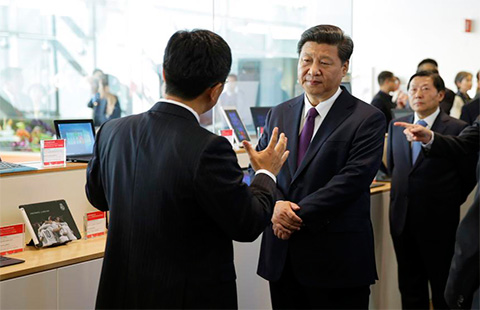In key areas of science and technology, Xinjiang has established and implemented a fund for special training of science and technology talents of ethnic minority origins since 2000. The number of ethnic minority technical professionals in Xinjiang increased from 124,300 in 1985 to 294,400 in 2014, and the proportion rose from 34.43 percent to 58.37 percent of the total number of such people in the region. The number of ethnic minority professionals with academic titles equivalent to professor and associate professor reached 21,100 in 2014.
The ethnic regional autonomy provides an institutional guarantee to ethnic unity. The region's population totaled 5.1 million in 1955 while by 2014 it had increased to over 23.2 million, of which 14.6 million were ethnic minorities, making up 63 percent of the total. The region has carried out all kinds of educational programs advocating ethnic unity, paying particular attention to education of the youth, as evidenced by courses on ethnic unity and knowledge about the various ethnic groups offered in various institutions of learning - from primary schools to universities. In Xinjiang, unremitting efforts have also been made in holding activities promoting ethnic unity and progress. To advocate ethnic unity and counter acts undermining it, the autonomous region has since 1983 held seven meetings awarding those making outstanding contribution to ethnic unity and progress, and commending units and individuals who have excelled in this regard. To date, the State Council, the State Ethnic Affairs Commission and the Xinjiang Uygur Autonomous Region have commended 1,304 model units and 2,272 exemplary individuals. Since 1983, the region has held an "educational month of ethnic unity" each May, carrying out intensive and extensive public publicity on ethnic unity. In 2009, the region promulgated the Regulations of the Xinjiang Uygur Autonomous Region on Ethnic Unity Education, further regulating ethnic unity education activities in order to call people of all ethnic groups to safeguard ethnic unity. By the end of 2010, the region had enacted the Measures for the Administration of Commendation of Role Models Contributing to Ethnic Unity Activities (Trial). The region encourages all members of ethnic groups to strengthen contact, exchange, integration and mutual support mechanisms, and advocates that primary or secondary school students of all ethnic groups study in the same classes and schools. It has become an important ideological guarantee for ethnic unity that "the Han Chinese cannot live without the ethnic minorities, the ethnic minorities cannot do without the Han Chinese, and no any one minority group can live without the other minority groups."
Along with the region's economic and social development in recent years, increasing mobility has been witnessed in the population of different ethnic groups in Xinjiang. There has been a rising trend in the urbanization and scattered living of ethnic minorities (who used to live in remote rural areas in concentrated communities - ed.), and as such the contact and exchange among them have grown ever closer. In work, study and entertainment as well as shared community life, people of different ethnic origins have enhanced their friendship and mutual understanding.

 Here's what's on the menu for the state dinner
Here's what's on the menu for the state dinner
 President Xi visits Microsoft campus in Seattle
President Xi visits Microsoft campus in Seattle Xi revisits Lincoln High School after 1993 bond
Xi revisits Lincoln High School after 1993 bond
 Chinese, US business leaders gather at roundtable meeting
Chinese, US business leaders gather at roundtable meeting Xi visits assembly line of plane manufacturer Boeing in US
Xi visits assembly line of plane manufacturer Boeing in US First Lady tours Fred Hutchson Cancer Research Center
First Lady tours Fred Hutchson Cancer Research Center
 Boeing to sell 300 planes to China
Boeing to sell 300 planes to China Sino-US ties need more understanding: Xi
Sino-US ties need more understanding: Xi















